SS Rowan sinking: The disaster that rocked jazz music
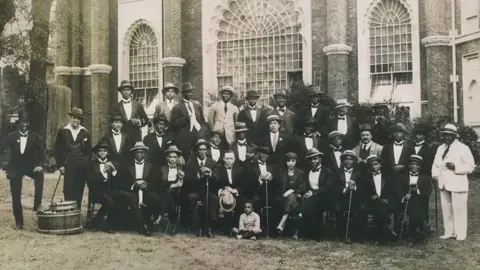 Courtesy Juliet Jones
Courtesy Juliet JonesIn the early hours of 9 October 1921, the waters off Galloway were the scene of one of their worst disasters.
A three-vessel accident in thick fog claimed the lives of 36 people.
A number of them were members of the Southern Syncopated Orchestra (SSO) - a jazz band described as the "pop stars" of their day.
They had just finished their tour of Scotland in Glasgow and were on their way on board the SS Rowan to perform in Ireland when disaster struck.
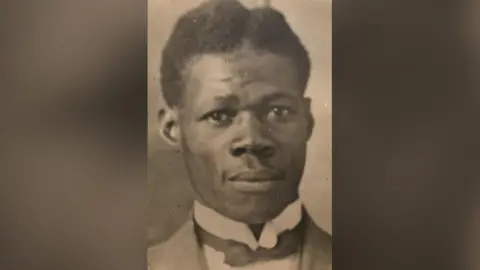 Juliet Jones
Juliet JonesJuliet Jones' grandfather, Frank Bates, was a tenor with the SSO.
"He was one of the nine musicians that were killed in the disaster," she said.
He was born in Barbados and had come to Britain with ambitions of becoming a doctor.
"He went to do his training at King's College in London," she said.
"But he found out he was colour blind and that was what they failed him on."
However, he started to get small parts in theatres in the capital and had musical talent.
"I believe he did play the banjo but that wasn't what he did in the orchestra, he was a tenor," she said.
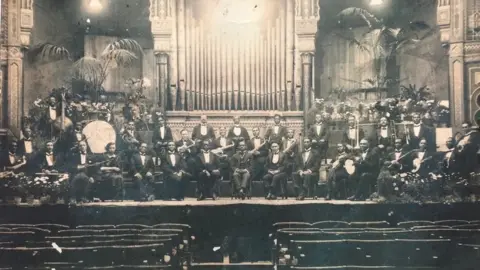 Juliet Jones
Juliet JonesThe SSO was formed by US composer Will Marion Cook and featured British West Indian, West African and American musicians.
It proved to be a big hit with audiences.
"They were the pop stars of the day," said Ms Jones.
"They were a favourite of King George V, they would be at Buckingham Palace.
"They put the spark in that early jazz."
 Juliet Jones
Juliet JonesThey put on what Ms Jones described as a "proper show" and interacted with their audience, teaching them to dance.
Among their highlights was playing at the Royal Albert Hall for the first anniversary of the Armistice.
By 1921, her grandfather was aged 35 and had married his Welsh wife Fanny Vivian and had two daughters.
He was part of the touring party which wowed crowds in Glasgow before setting off for Ireland.
 Sandy Rankin
Sandy RankinLocal historian Sandy Rankin, originally from Portpatrick, remembers growing up listening to his grandfather telling stories of the dramatic rescues, and tragedies, along the Galloway coast.
His wife's great-grandfather, Donald Brown, was captain of the Rowan.
Mr Rankin said the SSO had just finished its Scottish tour at the Lyric Theatre in Glasgow when it made its ill-fated trip.
"The Rowan was due to leave about midday from Clydebank, but the band had a matinee at about three o'clock in the afternoon," he said.
"It was agreed the Rowan would wait at Greenock for the orchestra when they finished."
They were heading down the west coast of Scotland when they hit quite heavy banks of fog, but Mr Rankin said the ship did not reduce its speed.
Another vessel, the West Camak, was heading, more slowly, in the opposite direction shortly after midnight.
"They were feeling their way up the coast," said Mr Rankin.
"They were listening out for the Corsewall lighthouse fog horn."
The two vessels collided with a "dramatic, great crash" but there was time for passengers to get lifejackets on and prepare lifeboats.
However, the situation deteriorated shortly afterwards when a third ship - the Clan Malcolm - struck the Rowan as well.
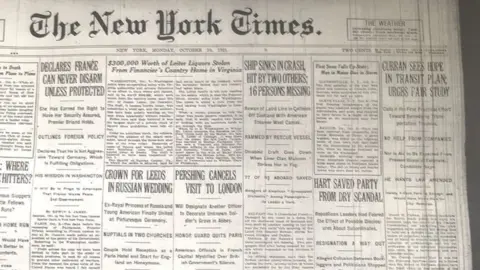 Juliet Jones
Juliet Jones"The Rowan went down in about two minutes," said Mr Rankin.
"Some were thrown into the water, at least two or three people actually jumped onto the Clan Malcolm."
Many of the people on board survived - possibly due to the time they' had to prepare - but dozens still lost their lives as the destroyer the HMS Wrestler went to the accident scene to assist.
Ms Jones said word got back to her grandmother, "anecdotal evidence", of what happened in the waters off south-west Scotland.
She said that, after the women and children were safe, her grandfather would have been one of the last ones on board.
"As they now saw the ship looming toward them, some of them went to jump," she said.
"My grandfather, he must have lost his footing, because he went in between the two ships."
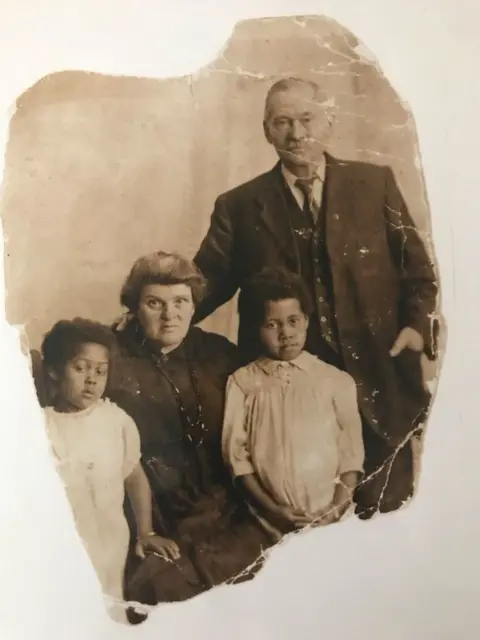 Juliet Jones
Juliet Jones
Despite the loss of lives, the orchestra would go on to complete its delayed dates in Ireland, but it would be disbanded soon afterwards.
Ms Jones' grandmother went to work in a laundry in order to bring up her children, who were looked after by her parents.
Members of the family came back to Scotland for the 85th anniversary of the disaster and a wreath was laid at the spot where Frank Bates died,but she said there were no plans for events to mark the centenary.
Mr Rankin, however, is working on a book about the sinking of the SS Rowan.
"It is one of the shipwrecks that the locals never really knew about because it all took place in the North Channel," he said.
He now hopes to tell its story to a wider audience.
